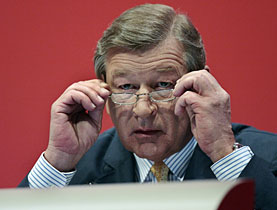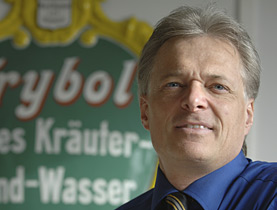Ospel under fire but his UBS plans go through

Shareholders of Switzerland's largest bank, UBS, have backed a SFr13 billion ($12.17 billion) capital injection from Singapore and an unnamed Middle East investor.
The vote, carried by a large majority at an extraordinary meeting in Basel, came after UBS chairman Marcel Ospel had been given a rough ride over the bank’s losses in the United States subprime crisis.
“We believe that this measure is absolutely necessary,” Ospel told the meeting. He described the current financial crisis as possibly the most difficult since the stock market crash of 1929.
An alternative proposal from Swiss pension fund Profond to extend the generous terms offered to the foreign investors to existing shareholders was rejected.
Ospel has survived at the helm of the bank despite it running up $18 billion in charges following the subprime crisis.
Facing increasing calls for his resignation in recent weeks, Ospel said he would not “thoughtlessly relinquish” his responsibilities. “I intend to ensure that UBS gets back on the road to success.”
Earlier during the meeting, UBS turned down a special audit into last year’s accounts.
Security scare
The Ethos investment foundation – one of UBS’ chief critics – claimed it was necessary because UBS had failed in its responsibility to investors.
The move was turned down at the meeting in the northern Swiss city by 363,771,934 votes to 314,065,169. Ospel had argued the bank was already cooperating with the Swiss Federal Banking Commission on a thorough probe.
The vote nearly turned into farce after one shareholder demanded a re-run because he had lost his electronic voting device. He was eventually persuaded to step down after a lengthy and heated discussion with UBS legal officials.
Shareholders also approved the board’s proposal to pay out dividends in the form of shares instead of cash.
The meeting was earlier interrupted when a critic of Ospel tried to reach the podium.
The man who caused a security alert was Thomas Minder, the Swiss entrepreneur behind a people’s initiative to reduce what he considers are exorbitant salaries paid to some executives, including Ospel.
Marathon
The embattled chairman left the extraordinary meeting of shareholders in Basel for a while before the marathon session continued. Security officials had prevented Minder from climbing onto the stage.
The scare did not secure Ospel much sympathy from the 6,454 disgruntled shareholders, however, as they took to the podium one after the other to vent their spleen on the man they deemed to be responsible for the bank’s troubles.
Several called for Ospel to step down or relinquish his salary in addition to his bonus. Some of the criticism was scathing and personal, with one speaker inviting Ospel to “stick to your knitting”.
Others were bitter about the large bonuses being paid to bankers, with one referring to the sums as “daylight robbery” and another calling for an end to the “Americanisation of the Swiss economy”.
With 52 speakers scheduled to deliver their verdicts even before the first vote was taken, the conference voted to deny most of them their opportunity so as to prevent the meeting from running into the small hours.
Ospel hit back at the criticism by declaring that “popularity is not a benchmark against which we measure our actions”.
“We have to accept that we have become a media target and that public opinion is against us. It is unpleasant and hurtful at times, but it is not crucial,” he added.
The UBS board scored victories in all three crucial votes as shareholders backed their rescue plan. But shareholders will vote again at the bank’s annual shareholders’ meeting in April on the recommendation to retain Ospel as chairman for another year.
swissinfo, Matthew Allen in Basel
UBS endured a tough 2007, starting with the collapse of its hedge fund Dillon Read Capital management. Two months after that, in July, chief executive Peter Wuffli abruptly departed without clear explanation.
In October of last year, UBS said it would cut 1,500 jobs in its investment banking arm, including its head Huw Jenkins. UBS chief financial officer, Clive Standish, also left at the same time.
Later that month the bank announced it was writing off SFr4.2 billion on subprime losses and SFr726 million pre-tax loss for the third quarter – the first quarterly loss in nine years.
In December UBS said another $10 billion would be written off as the US subprime crisis deepened.
A further $4 billion was written off in January, bringing the total losses to around SFr20 billion.
UBS has filed a counter lawsuit against Germany’s HSH Nordbank, which said on Tuesday it was suing the Swiss bank for US$275 million in damages over losses stemming from mortgage securities that had turned sour.
HSH accused UBS of fraudulent actions related to US$500 million in collateralised debt obligations. But UBS has reacted with its own lawsuit, filed in London, that defends its position.
UBS chief legal counsel Peter Kurer told the bank’s extraordinary general meeting that “there is not much chance we will suffer.”
He added that UBS had respected all of the wishes HSH had expressed when the sale was negotiated and that the German bank “did make profits.”

In compliance with the JTI standards
More: SWI swissinfo.ch certified by the Journalism Trust Initiative












You can find an overview of ongoing debates with our journalists here . Please join us!
If you want to start a conversation about a topic raised in this article or want to report factual errors, email us at english@swissinfo.ch.